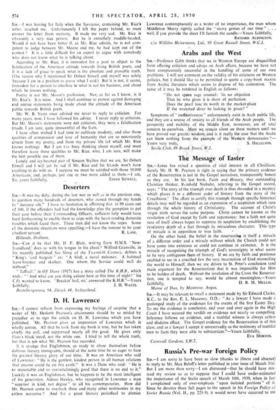The Message of Easter SIR,—Janus has raised a question of
vital interest to all Christians. Surely Mr. H. W. Pearson is right in saying that the primary evidence of the Resurrection is not in the Gospel narratives, transparently honest as they are. In his last book, Faith and History, that outstanding Christian thinker, Reinhold Niebuhr, referring to the Gospel record, says: "The story of the triumph over death is thus shrouded in a mystery which places -it in a different order of history from the story of the Crucifixion." The effort to certify this triumph through specific historical details may well be regarded as an expression of a scepticism which runs through the whole history of Christianity. The account of Christ's virgin birth serves the same purpose. Christ cannot be known as the revelation of God except by faith and repentante: but a faith not quite sure of itself always hopes to suppress its scepticism by establishing the revelatory depth of a fact through its miraculous character. This type of miracle is in opposition to true faith.
On the other hand, the belief in the resurrecties is -itself a miracle of a different order and a miracle without which the Church could not have come into existence or could not continue in existence. It is the miracle of recognising the triumph of God's sovereignty in what seems to be very ambiguous-1*ns of history. If we are by faith and penitence enabled to see in a crucified Jew the very incarnation of God reconciling the world to Himself, then we are driven to St. Peter's conclusion (and main argument for the Resurrection) that it was impossible for Him to be holden of death. Without the revelation of the Cross the Resurrec- tion, one is tempted to say, would be almost meaningless.—Yours faithfully, D. B. M. MELLIS. Manse of Dun, by Montrose, Angus.










































 Previous page
Previous page